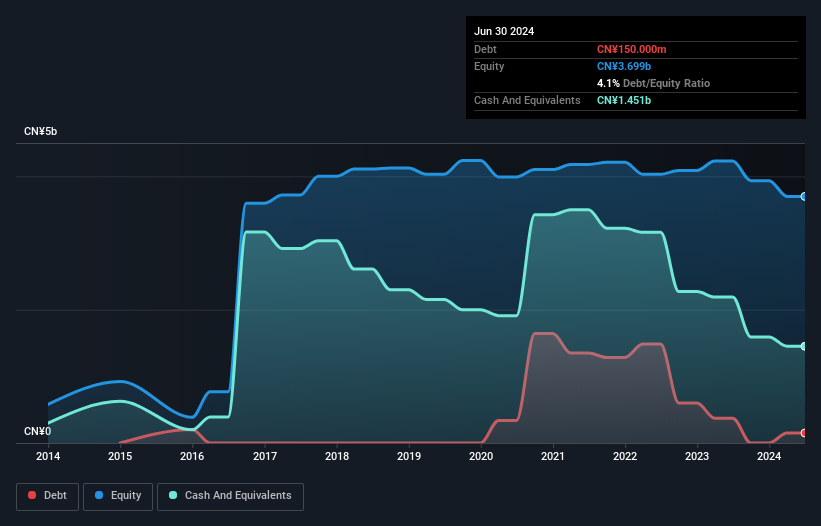Zhou Hei Ya International Holdings (HKG:1458) Has A Pretty Healthy Balance Sheet
Howard Marks put it nicely when he said that, rather than worrying about share price volatility, 'The possibility of permanent loss is the risk I worry about... and every practical investor I know worries about.' So it seems the smart money knows that debt - which is usually involved in bankruptcies - is a very important factor, when you assess how risky a company is. We can see that Zhou Hei Ya International Holdings Company Limited (HKG:1458) does use debt in its business. But the more important question is: how much risk is that debt creating?
Why Does Debt Bring Risk?
Debt and other liabilities become risky for a business when it cannot easily fulfill those obligations, either with free cash flow or by raising capital at an attractive price. If things get really bad, the lenders can take control of the business. However, a more usual (but still expensive) situation is where a company must dilute shareholders at a cheap share price simply to get debt under control. Having said that, the most common situation is where a company manages its debt reasonably well - and to its own advantage. When we think about a company's use of debt, we first look at cash and debt together.
View our latest analysis for Zhou Hei Ya International Holdings
What Is Zhou Hei Ya International Holdings's Net Debt?
As you can see below, Zhou Hei Ya International Holdings had CN¥150.0m of debt at June 2024, down from CN¥370.6m a year prior. However, its balance sheet shows it holds CN¥1.45b in cash, so it actually has CN¥1.30b net cash.

How Healthy Is Zhou Hei Ya International Holdings' Balance Sheet?
According to the last reported balance sheet, Zhou Hei Ya International Holdings had liabilities of CN¥805.1m due within 12 months, and liabilities of CN¥191.7m due beyond 12 months. Offsetting this, it had CN¥1.45b in cash and CN¥105.5m in receivables that were due within 12 months. So it can boast CN¥559.3m more liquid assets than total liabilities.
This excess liquidity suggests that Zhou Hei Ya International Holdings is taking a careful approach to debt. Due to its strong net asset position, it is not likely to face issues with its lenders. Simply put, the fact that Zhou Hei Ya International Holdings has more cash than debt is arguably a good indication that it can manage its debt safely.
But the bad news is that Zhou Hei Ya International Holdings has seen its EBIT plunge 19% in the last twelve months. We think hat kind of performance, if repeated frequently, could well lead to difficulties for the stock. The balance sheet is clearly the area to focus on when you are analysing debt. But ultimately the future profitability of the business will decide if Zhou Hei Ya International Holdings can strengthen its balance sheet over time. So if you want to see what the professionals think, you might find this free report on analyst profit forecasts to be interesting.
But our final consideration is also important, because a company cannot pay debt with paper profits; it needs cold hard cash. While Zhou Hei Ya International Holdings has net cash on its balance sheet, it's still worth taking a look at its ability to convert earnings before interest and tax (EBIT) to free cash flow, to help us understand how quickly it is building (or eroding) that cash balance. Over the last three years, Zhou Hei Ya International Holdings actually produced more free cash flow than EBIT. There's nothing better than incoming cash when it comes to staying in your lenders' good graces.
Summing Up
While we empathize with investors who find debt concerning, you should keep in mind that Zhou Hei Ya International Holdings has net cash of CN¥1.30b, as well as more liquid assets than liabilities. And it impressed us with free cash flow of CN¥315m, being 274% of its EBIT. So we don't think Zhou Hei Ya International Holdings's use of debt is risky. There's no doubt that we learn most about debt from the balance sheet. However, not all investment risk resides within the balance sheet - far from it. To that end, you should be aware of the 1 warning sign we've spotted with Zhou Hei Ya International Holdings .
If you're interested in investing in businesses that can grow profits without the burden of debt, then check out this free list of growing businesses that have net cash on the balance sheet.
Have feedback on this article? Concerned about the content? Get in touch with us directly. Alternatively, email editorial-team (at) simplywallst.com.
This article by Simply Wall St is general in nature. We provide commentary based on historical data and analyst forecasts only using an unbiased methodology and our articles are not intended to be financial advice. It does not constitute a recommendation to buy or sell any stock, and does not take account of your objectives, or your financial situation. We aim to bring you long-term focused analysis driven by fundamental data. Note that our analysis may not factor in the latest price-sensitive company announcements or qualitative material. Simply Wall St has no position in any stocks mentioned.
 Index Options
Index Options CME Group
CME Group Nasdaq
Nasdaq Cboe
Cboe TradingView
TradingView Wall Street Journal
Wall Street Journal